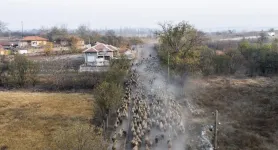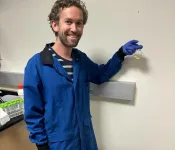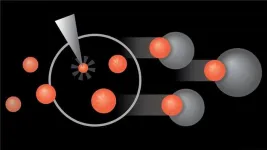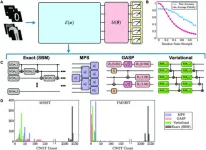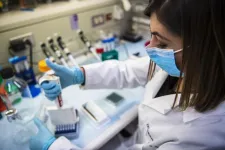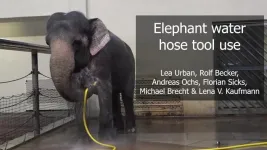(Press-News.org) A Branco Weiss Fellowship – Society in Science has been awarded to Dr Gergana Daskalova. The fellowship funds Daskalova’s research project “Biodiversity change amidst disappearing human traditions and changing socio-economics”. She joins the Department of Conservation Biology at the University of Göttingen to work together with Professor Johannes Kamp. The five-year fellowship, which is worth over €530,000, will enable Daskalova to investigate the ecological and human fingerprints of land abandonment. Considering the question from both a local and a global perspective, Daskalova’s research will reveal what happens to nature when people leave, and how to make the best of the land left behind.
We are living amidst humanity’s largest ever migration, with more people leaving rural areas for urban centres than ever before. In less than 50 years, rural populations have decreased by 25%, creating demographic deserts and land no longer cultivated, with unknown consequences for nature and society. Daskalova’s research will bring together ecology, data science, remote sensing, sociology, anthropology, and psychology to shed new light on the interactions between humans and biodiversity. Her research will reveal how human migration and changing values and traditions influence biodiversity and what that means for nature conservation, human quality of life and likelihood of re-migration to rural areas.
In the first stage of her research, Daskalova will focus on Bulgaria – the quickest depopulating country in the world with a decrease from 9 to 6.5 million people between 1990 and 2021. She will conduct field studies across 30 villages spanning a gradient of depopulation. In the second stage, she will mobilize and collate open-access data to lead a global analysis of the impacts of changing socio-economics, bringing together issues such as aging rural populations, political shifts, and human conflict, and the effects on biodiversity change over space and time. The outputs of her research will capture both detailed relationships within abandonment, human culture and biodiversity, as well as broad-scale biodiversity patterns in a rapidly changing world.
Contact:
Dr Gergana Daskalova
University of Göttingen
Department of Conservation Biology
Bürgerstrasse 50, 37073 Goettingen, Germany
Email: gndaskalova@gmail.com / gergana.daskalova@biologie.uni-goettingen.de
Tel: +359 899808407
https://gndaskalova.com
https://uni-goettingen.de/en/691489.html
A Branco Weiss Fellowship – Society in Science has been awarded to Dr Gergana Daskalova. The fellowship funds Daskalova’s research project “Biodiversity change amidst disappearing human traditions and changing socio-economics”. She joins the Department of Conservation Biology at the University of Göttingen to work together with Professor Johannes Kamp. The five-year fellowship, which is worth over €530,000, will enable Daskalova to investigate the ecological and human fingerprints of land abandonment. Considering the question from both a local and a global perspective, Daskalova’s research will reveal what happens to nature when people leave, and how to make the best of the land left behind.
We are living amidst humanity’s largest ever migration, with more people leaving rural areas for urban centres than ever before. In less than 50 years, rural populations have decreased by 25%, creating demographic deserts and land no longer cultivated, with unknown consequences for nature and society. Daskalova’s research will bring together ecology, data science, remote sensing, sociology, anthropology, and psychology to shed new light on the interactions between humans and biodiversity. Her research will reveal how human migration and changing values and traditions influence biodiversity and what that means for nature conservation, human quality of life and likelihood of re-migration to rural areas.
In the first stage of her research, Daskalova will focus on Bulgaria – the quickest depopulating country in the world with a decrease from 9 to 6.5 million people between 1990 and 2021. She will conduct field studies across 30 villages spanning a gradient of depopulation. In the second stage, she will mobilize and collate open-access data to lead a global analysis of the impacts of changing socio-economics, bringing together issues such as aging rural populations, political shifts, and human conflict, and the effects on biodiversity change over space and time. The outputs of her research will capture both detailed relationships within abandonment, human culture and biodiversity, as well as broad-scale biodiversity patterns in a rapidly changing world.
Contact:
Dr Gergana Daskalova
University of Göttingen
Department of Conservation Biology
Bürgerstrasse 50, 37073 Goettingen, Germany
Email: gndaskalova@gmail.com / gergana.daskalova@biologie.uni-goettingen.de
Tel: +359 899808407
https://gndaskalova.com
https://uni-goettingen.de/en/691489.html
END
Biodiversity change amidst disappearing human traditions
Researcher awarded Branco Weiss Fellowship to carry out research at Göttingen University
2024-11-08
ELSE PRESS RELEASES FROM THIS DATE:
New approaches to synthesize compounds for pharmaceutical research
2024-11-08
Junior Professor Johannes Walker, University of Göttingen, has been awarded an Exploration Grant from the Boehringer Ingelheim Foundation. Walker teaches and carries out research at the Institute for Organic and Biomolecular Chemistry. The award of 180,000 euros will enable Walker and his team to develop new approaches to synthesizing new compounds.
“The aim of our project is to develop new strategies for the synthesis of a particular group of new chemical compounds,’ Walker explains. These compounds are called saturated polycyclic molecules. They are structurally complex ...
Cohesion through resilient democratic communities
2024-11-08
A new EU joint research project led by the University of Göttingen will explore how migration, demographic change and current crises are affecting social cohesion and democratic structures in Europe. A key objective is to find out how resilient democratic structures can strengthen local communities in times of profound demographic change. The project “Identities - Migration - Democracy (We-ID)” has been awarded funding of around three million euros over three years by the European Union.
European societies are undergoing a profound demographic transformation: falling birth rates, rising life expectancy and migration are increasingly ...
UC Santa Cruz chemists discover new process to make biodiesel production easier, less energy intensive
2024-11-08
UC Santa Cruz chemists have discovered a new way to produce biodiesel from waste oil that both simplifies the process and requires relatively mild heat. This discovery has the potential to make the alternative fuel source much more appealing to the massive industrial sectors that are the backbone of the nation’s economy.
In 2022, the U.S. transportation sector alone used about 3 million barrels of diesel per day, accounting for about 75% of total consumption of the fuel in this country. That same year, ...
MD Anderson launches Institute for Cell Therapy Discovery & Innovation to deliver transformational new therapies
2024-11-08
HOUSTON ― The University of Texas MD Anderson Cancer Center today announced the launch of its Institute for Cell Therapy Discovery & Innovation, which will build upon longstanding MD Anderson clinical and research expertise to lead the world in developing and advancing impactful cell therapies for patients in need.
The institute will bring together top scientists and clinicians to lead exceptional discovery, translational and clinical research that will deliver new insights in immunology and cell engineering, fueling the creation of transformational new treatments that can be rapidly adapted to address emerging needs in cancer, autoimmune diseases, infections ...
New quantum encoding methods slash circuit complexity in machine learning
2024-11-08
A recent study by researchers from CSIRO and the University of Melbourne has made progress in quantum machine learning, a field aimed at achieving quantum advantage to outperform classical machine learning. Their work demonstrates that quantum circuits for data encoding in quantum machine learning can be greatly simplified without compromising accuracy or robustness. This research was published Sept.12 in Intelligent Computing, a Science Partner Journal.
The team’s results, validated through both simulations and experiments on IBM quantum devices, show that their innovative encoding methods reduced circuit ...
New research promises an unprecedented look at how psychosocial stress affects military service members’ heart health
2024-11-08
A University of Massachusetts Amherst researcher will examine the role of cumulative psychosocial stress – as well as race, ethnicity and gender – among U.S. military personnel to gauge their impact on cardiovascular health and healthcare utilization.
The study is funded with a $1 million grant from the Defense Health Agency, part of the Department of Defense (DoD). The findings will help the military develop programs for health promotion and health readiness for active duty and Reserve/National ...
Faster measurement of response to antibiotic treatment in sepsis patients using Dimeric HNL
2024-11-08
The biomarker human neutrophil lipocalin HNL, which was previously shown to be a useful indicator of bacterial infections, may also in the form of Dimeric HNL be used to effectively monitor the success of antibiotic treatment in sepsis. The first promising results in this regard were published in 2019 and now the research group has confirmed these results in a larger study. The study is published in the journal PLOS ONE.
Sepsis, the costliest disease to health care, is a life-threatening condition with high mortality if not diagnosed and ...
Cleveland Clinic announces updated findings in preventive breast cancer vaccine study
2024-11-08
November 8, 2024, CLEVELAND: Cleveland Clinic researchers are presenting updated findings from their novel study of a vaccine aimed at preventing triple-negative breast cancer, the most aggressive and lethal form of the disease.
The study team found that the investigational vaccine was generally well tolerated and produced an immune response in most patients. The team described the side effects of the vaccine, showed the highest tolerated dose to date, and presented the immunologic effects of the vaccine. Findings are being presented at the Society for Immunotherapy of Cancer Annual Meeting.
Launched in 2021 and funded by the U.S. Department of Defense, the ongoing ...
Intergenerational effects of adversity on mind-body health: Pathways through the gut-brain axis
2024-11-08
The Brain & Behavior Research Foundation (BBRF) is hosting a free webinar, “Intergenerational Effects of Adversity on Mind-Body Health: Pathways Through the Gut-Brain Axis” on Tuesday, November 12, 2024, at 2:00 pm ET. The presenter, Bridget Laura Callaghan, Ph.D., is an Assistant Professor in the Department of Psychology at the University of California, Los Angeles (UCLA). At UCLA, Dr. Callaghan directs the Brain & Body Lab in the Department of Psychology and also heads the Mental Disorders and Pain research theme at the Goodman Luskin Microbiome Center. The webinar host, Jeffrey Borenstein, M.D., is the President ...
Watch this elephant turn a hose into a sophisticated showering tool
2024-11-08
Tool use isn’t unique to humans. Chimpanzees use sticks as tools. Dolphins, crows, and elephants are known for their tool-use abilities, too. Now a report in the Cell Press journal Current Biology on November 8, 2024, highlights elephants’ remarkable skill in using a hose as a flexible shower head. As an unexpected bonus, researchers say they also have evidence that a fellow elephant knows how to turn the water off, perhaps as a kind of “prank.”
“Elephants are amazing with hoses,” says Michael Brecht ...
LAST 30 PRESS RELEASES:
Globe-trotting ancient ‘sea-salamander’ fossils rediscovered from Australia’s dawn of the Age of Dinosaurs
Roadmap for Europe’s biodiversity monitoring system
Novel camel antimicrobial peptides show promise against drug-resistant bacteria
Scientists discover why we know when to stop scratching an itch
A hidden reason inner ear cells die – and what it means for preventing hearing loss
Researchers discover how tuberculosis bacteria use a “stealth” mechanism to evade the immune system
New microscopy technique lets scientists see cells in unprecedented detail and color
Sometimes less is more: Scientists rethink how to pack medicine into tiny delivery capsules
Scientists build low-cost microscope to study living cells in zero gravity
The Biophysical Journal names Denis V. Titov the 2025 Paper of the Year-Early Career Investigator awardee
Scientists show how your body senses cold—and why menthol feels cool
Scientists deliver new molecule for getting DNA into cells
Study reveals insights about brain regions linked to OCD, informing potential treatments
Does ocean saltiness influence El Niño?
2026 Young Investigators: ONR celebrates new talent tackling warfighter challenges
Genetics help explain who gets the ‘telltale tingle’ from music, art and literature
Many Americans misunderstand medical aid in dying laws
Researchers publish landmark infectious disease study in ‘Science’
New NSF award supports innovative role-playing game approach to strengthening research security in academia
Kumar named to ACMA Emerging Leaders Program for 2026
AI language models could transform aquatic environmental risk assessment
New isotope tools reveal hidden pathways reshaping the global nitrogen cycle
Study reveals how antibiotic structure controls removal from water using biochar
Why chronic pain lasts longer in women: Immune cells offer clues
Toxic exposure creates epigenetic disease risk over 20 generations
More time spent on social media linked to steroid use intentions among boys and men
New study suggests a “kick it while it’s down” approach to cancer treatment could improve cure rates
Milken Institute, Ann Theodore Foundation launch new grant to support clinical trial for potential sarcoidosis treatment
New strategies boost effectiveness of CAR-NK therapy against cancer
Study: Adolescent cannabis use linked to doubling risk of psychotic and bipolar disorders
[Press-News.org] Biodiversity change amidst disappearing human traditionsResearcher awarded Branco Weiss Fellowship to carry out research at Göttingen University
